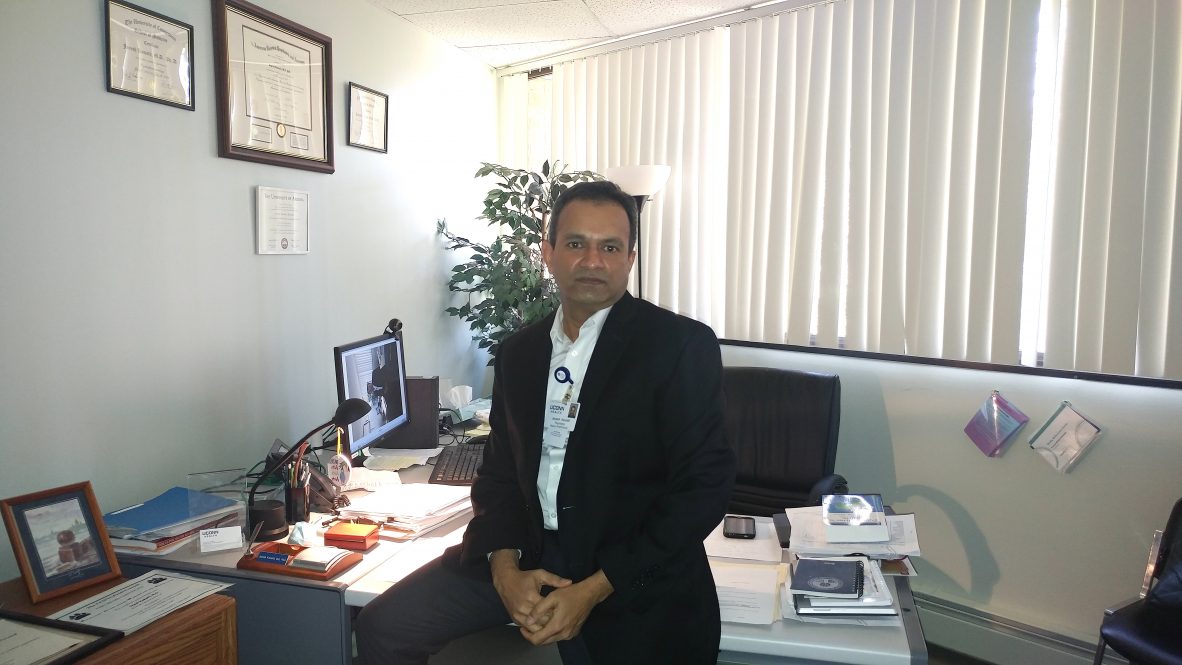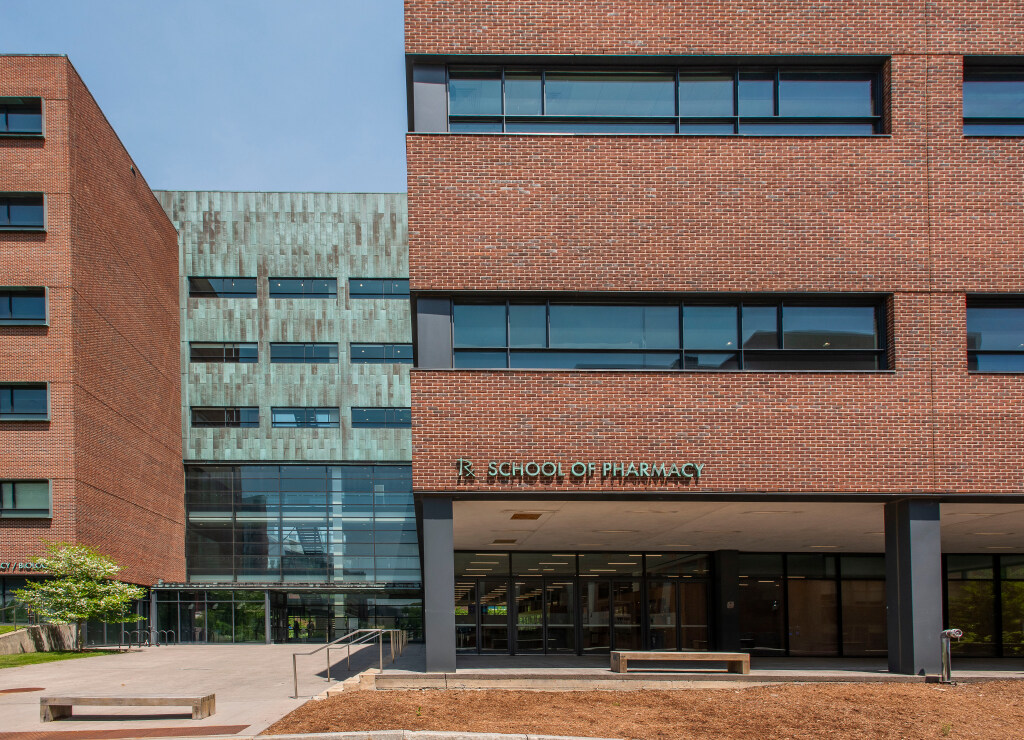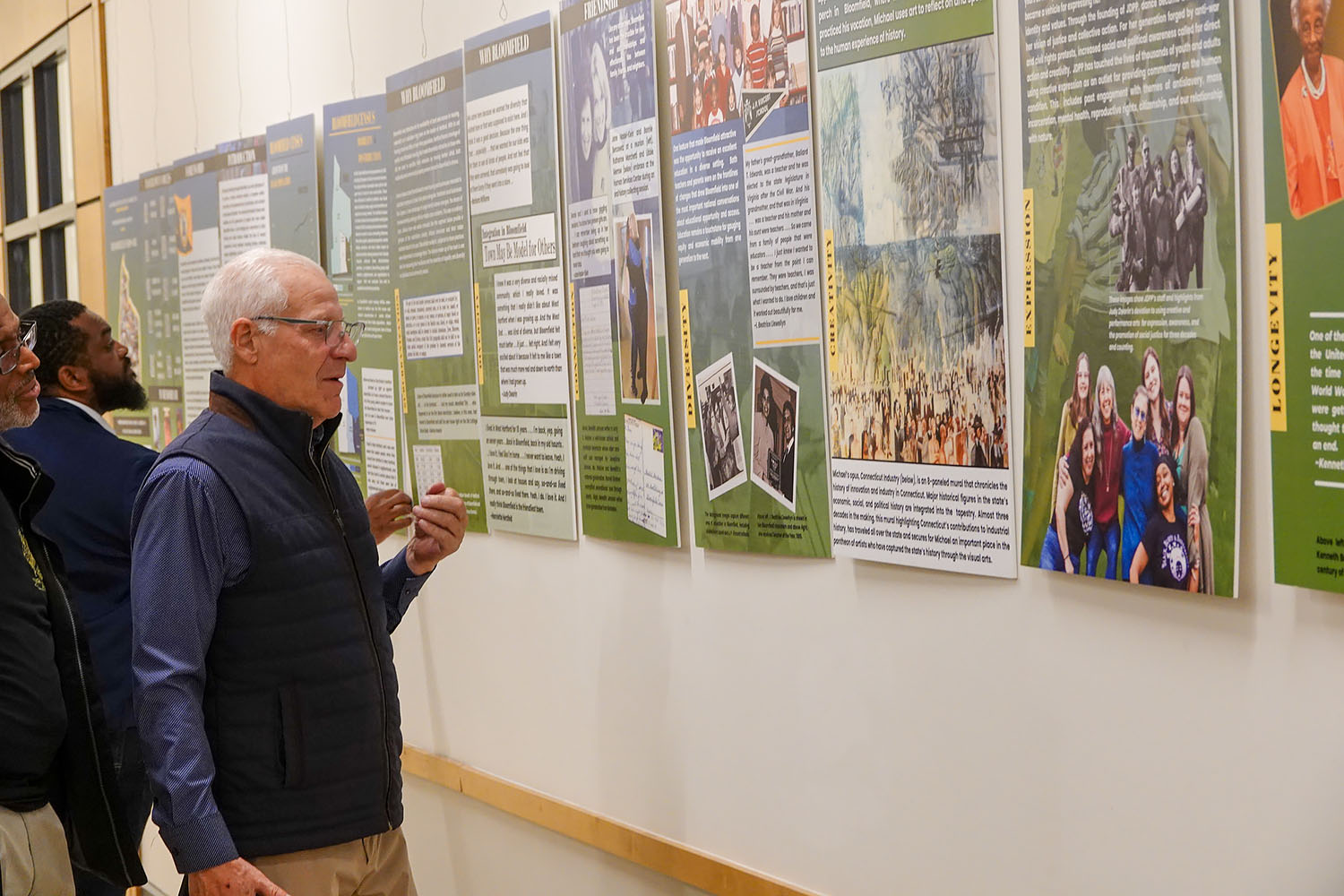Dr. Jayesh Kamath sees psychiatry differently. By nature of the field, psychiatry has not been able to take advantage of the objective tools and tests available to other medical fields.
Kamath, UConn Health professor of psychiatry and immunology, however, sees the potential for mobile health (mHealth) technologies to support psychiatrists, as well as the critical connections between mental and physical health for cancer patients.
Kamath holds an MD from St. Petersburg Pavlov State Medical University and a Ph.D. in immunology from the University of Arizona. Kamath has always been interested in research and the interface between medicine and psychiatry.
“I’ve always been interested in talking to people, listening to people, hearing their intimate stories and histories, and helping them cope with what’s going on in their lives,” Kamath says.
During his residency at the UConn School of Medicine, Kamath noticed the different approaches to psychiatry versus other medical fields.
One of the major challenges in psychiatry is the inability to collect patient data objectively. Mental health diagnoses largely rely on highly subjective interviews and questionnaires.
Psychiatrists do have the Diagnostic and Statistical Manual of Mental Disorders (DSM-5), but it is far from a perfect tool. The criteria are based on subjective interviews and can have trouble accounting for patients who present the same disorder differently.
“I really partially struggled with that,” Kamath says.
Mental health disorders are characterized both by internal feelings and external behaviors; Kamath is proving that the latter may be studied in the same way many other health problems are.
“We know behavior happens and changes with depression,” Kamath says. “We can capture these behaviors objectively. In the past, we didn’t have this technology to do that.”
Challenging Dogma
Kamath has worked with colleagues in the School of Engineering to develop an app, DepWatch, which collects data about behaviors associated with depression. Kamath is collaborating with Professor of Computer Science and Mathematics Alexander Russell; Professor of Computer Science and Engineering Bing Wang; and Frederick H. Leonhardt Professor of Computer Science Jinbo Bi.
This collaboration has been rewarding and challenging, Kamath says.
“It’s been a fascinating journey because both sides have had to learn a lot,” Kamath says. “But that’s where the innovation happens.”
DepWatch tracks measures such as how much a person is moving around, talking, texting, and engaging with social media as well as when they are active on their phone. If a person is consistently active late at night, this could be a cue that they aren’t sleeping regularly, which is a symptom of depression for some people.
“Both sides have had to learn a lot. But that’s where the innovation happens.” — Jayesh Kamath
This approach takes advantage of passive data collection. Participants use their phone normally while the app works in the background.
“The phone is a perfect sensing mechanism because we carry it around all the time,” Kamath says. “It collects a tremendous amount of data.”
The group’s previous study funded by the National Science Foundation collected smartphone data from 182 college students to prove their app can predict behavioral and cognitive depression symptoms.
The team is now conducting a four-year study funded by the National Institute of Mental Health to apply DepWatch to real clinical practices. Three clinical investigators at UConn Health will use DepWatch to determine if antidepressant treatment is working for their patients.
Psychiatrists commonly tell patients they should begin experiencing improvements four weeks after beginning new antidepressant treatment. However, not every antidepressant is effective for every patient. DepWatch can help clinicians determine early on if a medication is working.
Within the first two to three weeks on antidepressants, people’s behaviors may begin to change. These early behavioral changes can be a reliable signifier of if the treatment will continue to be effective.
“What we proposed is that we can capture this early improvement with the tool we’ve already developed,” Kamath says.
A major advantage of this technology is that it is more accurate than self-reporting. DepWatch provides clinicians with objective data and removes the burden from the patient to recall their behavior over several weeks.
The goal of this preliminary study is to determine if using DepWatch improves patient retention in antidepressant treatment, as many people exit treatment within the first few weeks if they fail to improve.
“We would be challenging the dogma of psychiatry,” Kamath says.
Body and Mind
In 2005 Kamath founded the Cancer Fatigue Interdisciplinary Clinic in the UConn Health Carole and Ray Neag Comprehensive Cancer Center. At the time, it was one of the first psycho-oncology clinics in Connecticut that was located within the cancer clinic.
Many cancer patients experience depression and anxiety. Even when they are referred to mental health providers, many do not go due to the stigma surrounding receiving help for mental health disorders. Some patients especially do not want to go to mental health clinics. However, many feel comfortable seeing mental health providers within the cancer clinics, a service Kamath’s clinic provides.
“It’s a taboo still,” Kamath says.
Cancer patients also often experience fatigue, which is associated with depression and other mental health disorders, during and after treatment.
For cancer patients, fatigue can persist for years after treatment and seriously impede their quality of life.
“That level of fatigue can really affect you in every possible way,” Kamath says.
In another area of his work, Kamath is investigating the links between physical and mental responses to cancer treatment.
During cancer treatment, patients’ levels of inflammation increase as their body works to destroy the cancer. Inflammation and fatigue go hand-in-hand, and when patients have high levels of inflammation early in treatment, it tends to persist after treatment, as does fatigue.
“For a certain subpopulation of patients with fatigue, inflammation persists long after treatment,” Kamath says. “It’s not supposed to.”
Bringing Tech to Treatment
Many other health care fields are already taking advantage of mHealth technologies to advance their care practices. Kamath says technology like DepWatch is helping bring psychiatry up to speed.
“This technology has given us significant opportunities to help with everything we do in psychiatry and we really need to grab that opportunity,” Kamath says. “We don’t want to be left behind.”
mHealth technologies can enhance the care mental health professionals can provide by combining information about how a patient is feeling –which can only be assessed through interviews – with objective behavioral data.
“Objectivity is important, which is what the technology gives us,” Kamath says. “But it does not replace our interviews, and it doesn’t replace our therapeutic connection with patients.”
Kamath says he and his team are interested in potentially commercializing their app once they have the results from this study.
DepWatch is a promising tool that could provide psychiatrists with easily calculable behavioral data to supplement their treatment.
“Would this product mean anything in the field?” Kamath says. “Yes, absolutely. It would mean a lot of things.”
Kamath hopes to expand the applications of this app to larger studies as well as other populations such as cancer patients or people with PTSD.
“We have this tool,” Kamath says. We just have to see where else we can apply it.”



